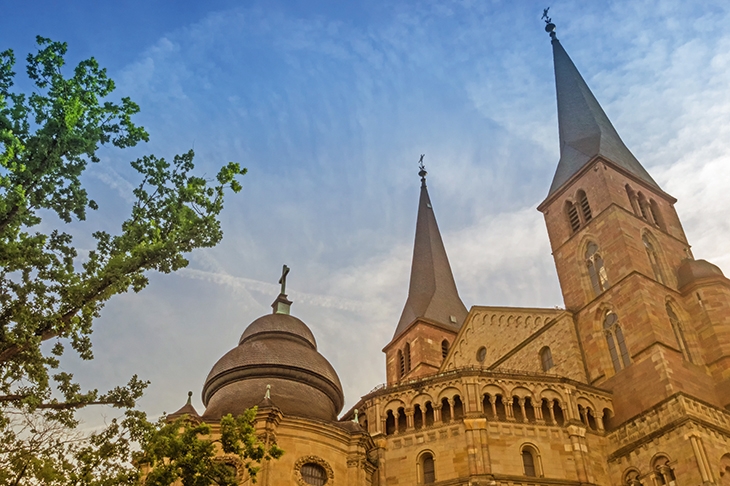‘Trier hates you,’ reads the graffiti outside the Karl-Marx-Wohnhaus in Trier. Actually, that’s a bit unfair. Trier doesn’t hate Marx, but it’s always had mixed feelings about its most famous son. Marx’s 200th birthday will be marked by several lavish exhibitions in Trier, which is ironic, for this quaint Rhineland city has never known quite what to make of the author of Das Kapital.
Marx was born in Trier on 5 May 1818, in a handsome house on the edge of the medieval old town that now houses the Karl Marx Museum. His father was a lawyer, his family were fairly well-to-do. When he was still a baby, they moved to the Karl-Marx-Wohnhaus in the city centre (now a drab convenience store) beside the Porta Nigra, a huge Roman gatehouse. Trier was one of the biggest cities in the Roman Empire. Relics of that époque are strewn all over town.
Marx lived here until his late teens, when he went away to university. He met his wife Jenny here and made his first forays into journalism. Like a lot of clever, subversive teenagers, he became heartily sick of his hometown, but in fact it was the perfect kindergarten for the father of communism. After the French Revolution, Trier became part of the French Republic. After Napoleon was ousted, it became part of Prussia. Consequently, Marx grew up in a city with a split personality, torn between its autocratic rulers and its democratic roots.
The history of the Karl Marx Museum reflects Marx’s shifting status. After his death, in 1883, his birthplace was forgotten and neglected. In 1928, it was bought by Germany’s Social Democratic Party and turned into a museum. In 1933 the Nazis trashed the museum and turned it into the offices of the local party newspaper.
After the war it became a museum again, managed once more by the SPD. After the collapse of communism, interest in Marx waned, but the financial crisis of 2008 heralded a renaissance for the soothsayer of capitalist decay. The museum now attracts 40,000 visitors a year, 16,000 from Germany. The biggest number of foreign visitors (8,000) are from China.
Today Trier is a pleasant, sleepy place, ideal for a long, lazy weekend. Like a lot of German cities, it was badly bombed during the war and rebuilt in a dreadful hurry, but the Altstadt is still pretty and the Roman ruins are spectacular: an amphitheatre, three bathhouses and a wonderful museum, crammed full of classical antiquities.
The Catholic cathedral, founded by Constantine, is one of the oldest in Christendom. His imperial throne room, three storeys high, now houses the Protestant church. You can cruise along the Moselle or wander through the vineyards — the local Riesling is divine. Becker’s is the best hotel, a sleek modernist building on the leafy outskirts. Despite the lousy exchange rate, it’s great value. Rooms start at €70. Three courses in the excellent restaurant cost just €25.
Trudging back to the train station, homeward bound, I passed the Karl Marx Museum and found a gaggle of grinning Chinese tourists posing for group snapshots outside. Marx is far more famous in China than he is in Europe, they told me. The Chinese Communist Party has around 90,000,000 members.






Comments